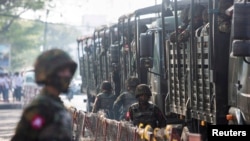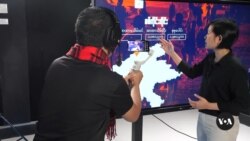One works as a teacher. Others pretend to be students and shopkeepers. In Myanmar, their day jobs help mask their real profession as journalists.
With the space for independent journalism all but eliminated since the February 2021 military coup, some journalists still working inside Myanmar are using cover jobs as a form of protection.
The trend underscores both the resiliency of Myanmar media and the threats posed by the country’s military, analysts say.
Since the military overthrew the civilian-led government over three years ago, the junta has cracked down hard on independent media, with over a dozen outlets banned and even more journalists jailed.
The risky environment prompted entire outlets to flee into exile and forced some journalists to stop working entirely. But some reporters decided to stay in Myanmar, where they report underground at great risk to their safety.
“We can be arrested by the military at any time,” one journalist secretly working inside Myanmar told VOA. They requested anonymity for safety reasons.
“Since the coup, I have already told people around me that I will no longer work as a journalist,” said the reporter. Instead, they use the cover of being a student studying foreign languages.
Another journalist in Myanmar said they convinced people in their town “that I abandoned journalist work.” A job as a teacher helps hide that they still work as a reporter.
Like all the journalists inside Myanmar who spoke with VOA for this article, they requested their identity be hidden for safety reasons.
With a history punctuated by periods of military rule, Myanmar’s media already had a playbook for creative ways to continue reporting and stay safe.
The trend of cover jobs is the latest sign “that Myanmar journalists do not want to give up easily,” a journalist who fled Myanmar after the coup and is now based in Bangkok told VOA.
Despite being outside Myanmar, they requested anonymity for fear of retaliation.
In 2023, Myanmar ranked second in the world in terms of the number of journalists jailed over their work, with at least 43 behind bars, according to the Committee to Protect Journalists, or CPJ.
Journalists in Myanmar say they believe the arrests are intended to silence media.
“The junta wants the country to be in darkness, and they don’t want the world to know the real situation in the country,” the teacher-journalist said. “This is the reason why the junta tries to arrest journalists.”
The targeting of journalists parallels the military’s repression of the entire population. The Thailand-based Assistance Association for Political Prisoners says the military and its affiliated groups are responsible for over 4,500 deaths, and that more than 20,000 people are currently detained for resisting the coup.
Myanmar’s military did not reply to VOA’s request for comment.
Tom Andrews, the United Nations special rapporteur on the situation of human rights in Myanmar, says media inside the country take big risks.
“Journalists literally take their lives in their hands to do their work in Myanmar,” Andrews told VOA shortly before the third anniversary of the coup.
“The level of courage and commitment demonstrated by journalists working in Myanmar is just stunning and inspiring,” he said.
As recently as January, a journalist named Myat Thu Tan was shot and killed while in military custody in Myanmar’s Rakhine State.
A third journalist still inside the country said reporters “are the most wanted persons."
That journalist, who also asked for anonymity, is pretending to be a student studying foreign languages.
Among the numerous challenges of working undercover is a sense of isolation. The fear of being discovered by the military means they sometimes don’t even talk to other reporters in the country.
“Local journalists live in silence, so it is difficult to know each other,” said one of the journalists, with a cover as a student.
Keeping a secret life for years at a time is also exhausting, experts say.
“They have to hide themselves from friends and family. They have to basically create an entire second life while trying to very subtly do their part in the revolution against the military,” Oliver Spencer, a Chiang Mai-based expert on press freedom in Myanmar, told VOA.
The journalists, however, say being able to keep reporting inside Myanmar makes it worth it. The journalist who works as a teacher said they get a better sense of public opinion.
“If there are no journalists in the country, the junta will surely do what they want,” they said.







